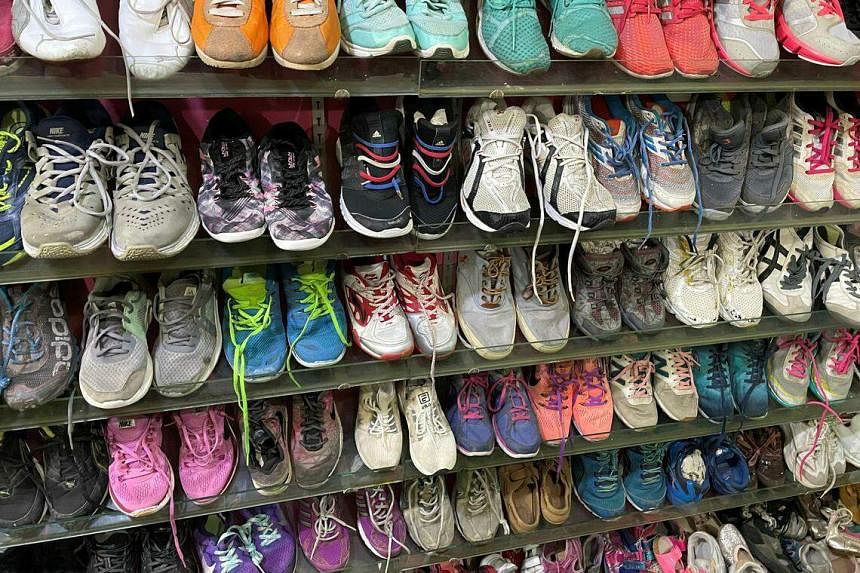SINGAPORE - National agency Sport Singapore (SportSG) and its partners in a shoe recycling project have tightened their processes since lapses were discovered, and these recovery steps include appointing only contractors and subcontractors that are not involved in any second-hand trading of textiles or shoes.
Revealing this in Parliament on Monday, Minister for Culture, Community and Youth Edwin Tong said the project partners will also ensure that all collected shoes are transported to local waste management firm Alba-WH’s premises without any aggregation or sorting at any intermediary premises, to avoid a mix-up.
The project partners will also conduct regular spot checks and inspections at contractors and subcontractors’ premises, he said, responding to questions from several MPs on efforts to strengthen the ministry’s oversight of the project.
A mix-up happened at the premises of Yok Impex, Alba-WH’s subcontractor, resulting in old sneakers meant to be recycled for use in building playgrounds and running tracks being mistakenly sold in Indonesia. Alba-WH has since terminated the services of Yok Impex.
The other project partners are sporting goods retailer Decathlon, chemical company Dow, Standard Chartered bank and surface solutions firm B.T. Sports.
Assuring the House that the Ministry of Culture, Community and Youth (MCCY) remains committed to Singapore’s national sustainability agenda, Mr Tong said: “I hope that this episode will not deter the public from supporting such initiatives as these are important and impactful in protecting our environment.”
He said he hopes Singaporeans will continue to support recycling efforts such as the project, noting that 10,000kg of shoes have been processed and used in sport infrastructure such as the running track at Kallang Football Hub, and an 888m jogging trail under construction in Jurong Town.
The remaining recycled granules are planned for use in sport centres in Serangoon, Bukit Canberra and Punggol, as well as in jogging tracks, fitness corners and playgrounds around Singapore, he said.
Launched by Dow in partnership with SportSG in 2021, the project aims to upcycle the soles from 170,000 pairs of shoes contributed by the public each year for use as materials for building jogging tracks, fitness areas and playgrounds over the next three years.
Contributors donated their used shoes at over 100 collection points islandwide, including at participating ActiveSG sport centres and stadiums, Decathlon stores, schools and tertiary institutions.
The collected shoes were expected to make their way to a Singapore recycling facility, where they would be ground into rubber granules for use in construction projects.
However, an investigative report by Reuters found that at least some of these donated shoes did not make it to the recycling facility.
Under its investigation, journalists had donated 11 pairs of shoes at different locations around Singapore and tracked them over a six-month period using Apple AirTags.
According to its report, none of the shoes made it to a Singapore recycling facility, with several pairs ending up for sale in crowded bazaars in neighbouring Batam and Indonesian capital Jakarta.
The lapse highlighted in the Reuters investigation prompted SportSG and its partners in the shoe recycling project to issue a joint apology on Feb 27.
On Monday, Leader of the Opposition and Workers’ Party chief Pritam Singh asked if MCCY and SportSG had evaluated whether the conversion of sports shoes into rubber granules was actually more green than the existing method of just using recycled tyres.
“Does this initiative move the needle?” he asked, highlighting greenwashing concerns raised in the Reuters report.
Greenwashing is the process of conveying a false impression or misleading information about how a product, policy or programme is environmentally sound.
Responding, Mr Tong said that the rubber density of tyres is different from that found in used shoes and an internal assessment found that the latter was better for use in running tracks and playgrounds.
“I won’t get into a debate over the efficacy of which material is best used for playgrounds and sports grounds and so on, but I will ensure that the point that you raise is fed back to the relevant engineers that they will study this,” said Mr Tong. “If nothing else, the grinding facility provides an additional avenue for waste material.”


